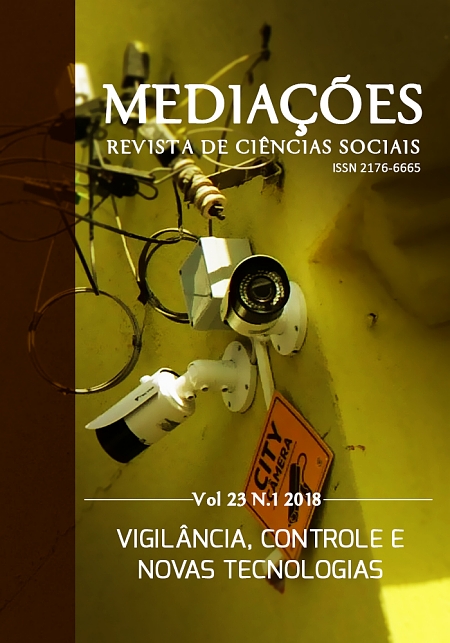Technologies of government, surveillance and transgression: an ethnographic study of electronic Ankle Bracelets
DOI:
https://doi.org/10.5433/2176-6665.2018v23n1p141Keywords:
Electronic ankle bracelets, Technology of government, Ethnography of objects.Abstract
This article is the result of an ethnographic research on the uses of electronic ankle bracelet, in the state of Rio Grande do Sul/RS. Electronic ankle bracelets are objects anchored in the ankle of criminal distress as an alternative to prision. The objective of this work is to reflect on the different ways in which this object is put into practice by the different publics that form and that are formed by this artifact, such as security agents, social workers, judges and people who use ankle bracelets and their families. The focus of this work will be on the mediation processes that accompany the electronic bracelet, from its objectives idealized by the agents of the State - such as the creation of new subjectivities - to the various accommodations and consequences of this technology of government in the daily life of the users themselves.Downloads
References
BRASIL. Lei nº 12.258, de 15 de junho de 2010. Altera o Decreto-Lei no 2.848, de 7 de dezembro de 1940 (Código Penal), e a Lei no 7.210, de 11 de julho de 1984 (Lei de Execução Penal), para prever a possibilidade de utilização de equipamento de vigilância indireta pelo condenado nos casos em que especifica.
CAMPELLO, Ricardo. Circulações governadas: o monitoramento eletrônico de presos no Brasil. Aurora: Revista de Arte, Mídia e Política, São Paulo, v. 7, n. 19, p. 51-69, 2014.
CHANTRAINE, Gilles. A prisão pós disciplinar. Revista Brasileira de Ciências Criminais, São Paulo, n. 62, p. 79-106, 2006.
FOUCAULT, Michel. Vigiar e punir: nascimento da prisão. Rio de Janeiro: Vozes, 2009.
GRAHAM, Stephen et al. The politics of open defecation: informality, body, and infrastructure in Mumbai. Antipode, Worcester, v. 47, n. 1, p. 98-120, 2015.
GUPTA, Akhil. An anthropology of electricity from the global south. Cultural Anthropology, USA, v. 30, n. 4, p. 555-568, 2015.
LARKIN, Brian. The politics and poetics of infrastructure. Annual Review of Anthropology, USA, v. 42, p. 327-343, 2013.
LATOUR, Bruno. Jamais fomos modernos. São Paulo: Editora 34, 1994.
LATOUR, Bruno. Reagregando o social: uma introdução à teoria do ator-rede. Bauru: Edusc, 2012.
LAW, Jonh; BIJKER, Wiebe. Shaping Technology/ Building society: Studies in sociotechnical chance. The MIT Press, 1992
LAW, John; MOL, Annemarie. Situating technoscience: an inquiry into spatialities. Environment and planning D: society and space, Thousand Oaks, v. 19, n. 5, p. 609-621, 2001.
MARCUS, George. Ethnography in/of the world system: the emergence of multisited ethnography. Annual Review of Anthropology, Palo Alto, v. 24, p. 95-117, 1995.
MILLER, Peter; ROSE, Nikolas. Governing economic life. Foucault's New Domains, v.19, n.1, 1993
MOL, Annemarie; LAET, Marianne. The zimbabwe bush pump. mechanics of a fluid technology, Social Studies of Science, London, v. 30, n. 2, p. 225-263, 2000.
ONG, Aihwa. Buddha is hiding: refugees, citizenship, the new America. California: University of California Press, 2003.
ROSE, Nicolas. Powers of freedom: reframing political thought. Cambridge: Cambridge University Press, 1999.
SCHNITZLER, Antina. Traveling technologies: infrastructure, ethical regimes, and the materiality of politics in South Africa. Cultural Anthropology, USA, v. 28, n. 4, p. 670-693, 2013.
Downloads
Published
How to Cite
Issue
Section
License
Copyright (c) 2018 Helena Patini Lancellotti

This work is licensed under a Creative Commons Attribution 4.0 International License.
Copyright on articles published in Mediações belongs to the author(s): in the case of partial or entire republication of the original publication, we ask author(s) to indicate the original publication in the periodical.
Mediações uses the Creative Commons Attribution 4.0 International license, which allows Open Access, enabling any user to read, download, copy and disseminate its content so long as adequately referenced.
The opinions expressed by the author(s) are their sole responsibility.
































